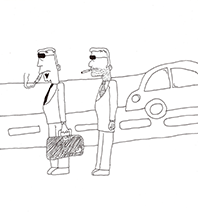
I ran across a copy of Up in Honey’s Room the other day, and enjoyed the pleasure of holding an unread Elmore Leonard novel in my hand.
It didn’t stay unread for long. Adding to the general fun of a crime/spy story set in 1945 Detroit, Leonard makes it the third novel in a family saga. The hero is U.S. marshal Carl Webster, a bit older than he was in The Hot Kid (1930s Oklahoma), with cameo appearances by his father Virgil, a major character in Cuba Libre (the Spanish-American War in 1898).
The Websters and their womenfolk are typical Leonard characters, which means the men are bloody-minded individualists and the women are twice as tough and smart as the men.
Still writing in his mid-80s, Leonard has maintained a consistent style and vision for decades. You might call it hardboiled, but you’d be wrong.
Counting on the smart reader
Ernest Hemingway copied the unemotional narrative of the Icelandic sagas, where we know only what the characters say and do -- not what they think and feel. We have to deduce their thoughts. It was a very successful style, though it now sounds dated.
Dashiell Hammett and other 1930s writers used Hemingway’s style to create hardboiled crime fiction, which was really contemptuous of its characters’ thoughts and feelings. That in turn changed into the sadism of Mickey Spillaine and the self-conscious similes of Raymond Chandler -- similes that piled up like glittering poker chips in some crooked game where Death himself was the dealer.
Elmore Leonard went back to the Icelandic source and to the speech rhythms of working-class America. He assumes we have the intelligence to understand what his characters are going through, so he doesn’t waste our time telling us.
An odd sense of personal justice
But while his characters speak as naturally as Huck Finn, they are a little larger than life. They have a strong sense of personal justice. In Cuba Libre, one character robs a bank -- of exactly the amount he believes it owes him. Carl Webster, as a teenager in The Hot Kid, kills a man who’s stealing the Webster family cattle. He goes on to kill a lot of other people, without suffering noticeable psychological harm.
This kind of violent stoicism clearly appeals to many of us who feel nervous just walking past the kids in front of the convenience store. Leonard’s heroes keep cool even when crooks have them tied up at gunpoint.
And what crooks! Critics praised Hammett for giving murder back to people who had good reasons to commit it. Leonard gives murder to people who have stupid reasons to commit it. His villains are clever morons, ambitious beyond their abilities. They’re optimists, even idealists, believing in the American dream of endless ascent to wealth, over as many bodies as it takes.
As tough as the heroes are, and as vicious as the villains may be, Leonard’s women usually decide matters. They shelter and heal the heroes, and sometimes they beat the bad guys to the draw. The heroes are respectful of the women’s brains and sexiness, and sometimes baffled as well. The villains ensure their own downfall by underestimating the women.
Leonard is a political writer in more than male-female relations. In Bandits (1987), his semi-crooked heroes go after some money the CIA plans to give the Nicaraguan Contras. Freaky Deaky (1988) includes relics of the Black Panthers and the Weathermen. Pagan Babies (2000) deals with the genocide in Rwanda. He is not particularly preachy; politics is just part of his characters’ lives, and they respond accordingly.
The thriller as satire
Much of the authenticity of Leonard’s settings is thanks to his own long life in places like Detroit and Florida. Up in Honey’s Room portrays 1945 Detroit with details surely drawn from Leonard’s own youth.
But he also relies on research, sometimes too much. Cuba Libre turns into a kind of coal-burning techno-thriller as his characters rattle off the specs of the U.S. warships attacking Cuba. The characters in Up in Honey’s Room spend too much time needlessly talking about details of the war -- informing us, not each other.
Homer nodded, and so does Elmore. But we do learn a lot from him about forgotten aspects of American history, about the way bail bondsmen do business, and about the way a lot of American men wish they were. His deadpan style conceals a lot of deadpan humour, at the expense of both heroes and villains.
When the gunshots stop ringing in your ears, you realize you’re reading not just a thriller-writer, but a satirist comparable to Twain and Vonnegut. We will not see his like again.




